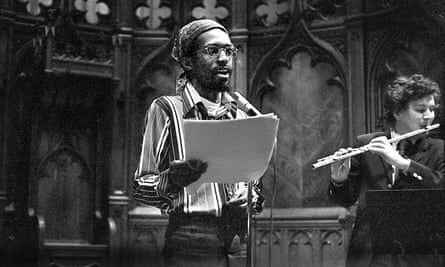When the label Phantom Limb got in touch about me creating music inspired by the late New York avant garde composer and pianist Julius Eastman, I had barely heard of him. They had a connection with his surviving brother, Gerry, which meant they had access to parts of his archive. I was gifted a zip drive of original pieces by him. Pretty quickly I realised that I knew lots of his peers – people such as Philip Glass and Steve Reich – who I learned about when I was studying music. But I never got taught anything about Julius Eastman. He was a long-standing part of that New York scene, but for a long time I didn’t even know Black composers existed. It’s not just an absence, it’s erasure – it feels as though there was effort made to leave him out.
Like me, Eastman was a queer Black composer, but while those aspects of his identity resonated with me, we’re also really different – we’re decades apart, and I’m from London. I’ve had it easier than him in some ways, even if my experiences haven’t been wholly positive, but I don’t face what he did, especially as a composer and musician. It’s an ambivalent, bittersweet thing to think about.
It’s not known exactly what happened to him in his final years. When he died, nobody really knew about his music, and it appears he was suffering from addiction, he was destitute and alone. It’s not until more recently that he’s been put back in the history books as the trailblazing composer he was, and that’s only down to the work of a few determined individuals such as his biographer, the composer and performer Mary Jane Leach, that we know anything about his music. And there still remain a lot of question marks and blank spaces that we will never fill in. We don’t even have all of his music.
What we do have is incredible – it’s so full of energy. His piano playing is dense and forceful, and in his compositions he uses heavy repetition of motifs. There’s such an intensity to his music – it’s not always emotive, but it’s often deeply affecting and heavily political – particularly in the titles he uses, such as Gay Guerrilla. He was making a statement so I kept his titles in parentheses after mine to pay respect to this aspect of his work. I distinctly remember listening to Stay on It one afternoon, which has since become one of my favourite pieces. I get completely lost in its repetitions and the power of this phrase “stay on it” – it’s so emotional, I cried. You can completely change the meaning by saying something over and over again, or in a different way. I used these repeating phrases at the beginning and the end of Choose to Be Gay (Femenine), which I recorded in one take – I get down what I’m feeling immediately, because you can’t replicate the feeling of that first take.
Today, it’s only really new recordings of his work that exist – people playing precisely from his manuscripts. I didn’t want to do that. I wanted this project to sound different, because we’re two composers on different sides of the world, working in different centuries, so I used hardware for the first time. What made it interesting was incorporating some of his sounds that feel like they’re of their time into my more modern electronic music. To put that in my software, to sync it and use my tools to play with it, felt futuristic. I asked what his music might sound like today, with a bunch of computers added.
I felt a lot of responsibility dealing with somebody’s legacy on this album – there were a lot of new emotions in it that I had never felt making other albums. I feel a bit like I’m carrying a torch forward, as part of the next generation of queer Black composers, but since there’s so much that is different about us, I’ve been thinking about it more as reinvention and paying respect. It’s great that his stuff has been rediscovered but there’s something sad about it when people are only rediscovering you after you’re dead. What does that do? Does it make a difference? I don’t know if there’s any redemption in it.
As told to Jennifer Lucy Allan

